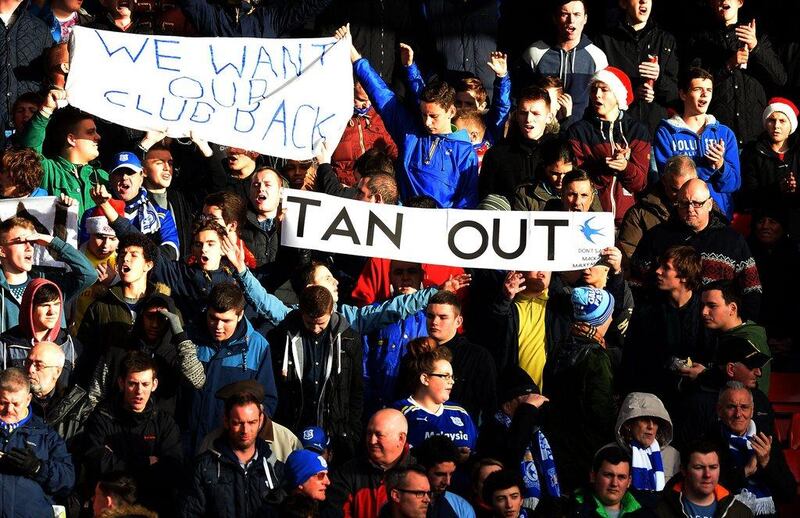Vincent Tan is not an idiot. Or so his record would indicate, anyway. It is hard to imagine an idiot amassing a wealth of US$1.3 billion (Dh4.78bn) in fields as diverse as property and gaming, fast-food outlets and holiday resorts.
He is a former bank clerk and insurance salesman who has displayed his financial acumen in a number of fields, but without appearing as greedy as some other successful businessmen. He signed “the giving pledge”, a scheme pioneered by Bill Gates, pledging to donate at least half his wealth to charity.
And yet if Tan is no fool, there is something needlessly, extraordinarily foolish about the way the Malaysian owner is running Cardiff City.
His “resign or be sacked” email to manager Malky Mackay seemed stupid, partly because the Scot is reportedly entitled to a seven-figure severance package if he is dismissed, but largely because he has destabilised a club that should be one of the success stories of the Premier League.
While Tan backed down and chairman Mehmet Dalman said Mackay is in charge “for the foreseeable future”, the likelihood remains that he is on borrowed time.
Yet a brief recap of Mackay’s two-and-a-half year reign shows that he took Cardiff to their first League Cup final in their history, ended their 51-year exile from the top flight and made a promising start to life in the Premier League.
The last Cardiff manager to achieve more, Fred Stewart, resigned in the year Franklin Delano Roosevelt moved into the White House.
However, Mackay’s mettle cannot be judged by results alone. He inherited a threadbare squad at a club with a reputation for losing major matches. He has recruited astutely, organised his side and imbued them with spirit. He has not merely united the Cardiff fanbase behind him but the divisive world of the Premier League.
It was instructive that the Liverpool supporters afforded him a standing ovation on Saturday. His tactics can be cautious but a dignified, defiant character inspires respect. Moreover, managers with Mackay’s record tend to be rewarded with new contracts, not threatened with rejection and removal from a job they have performed well.
It is a sign of the esteem in which he has held that many believe he would be a perfect fit for the vacancy at West Bromwich Albion, a more established Premier League club.
So Cardiff’s is a tale of ignorance and unrealistic expectations.
Given the litany of ludicrous English owners over the years – Peter Swales, George Reynolds, Mike Ashley, Ken Richardson, Darren Brown, Robert Maxwell – it is nonsensical to say the foreign invasion in the boardrooms is the root cause. There are men from thousands of miles away from the UK who have proved capable of respecting the culture of a club, proving progressive without destroying the historic, much treasured identity of their purchase.
The problem is caused by those who are too arrogant to listen and learn, too convinced of their convictions to heed advice and too distanced from the employees and supporters to understand the sentiment in the surrounding area.
When their opinions are not underpinned by footballing knowledge, it is a dangerous combination.
And so it is at Cardiff, where the head of recruitment Iain Moody was replaced by the untried 23-year-old Alisher Apsalyamov. It is a dysfunctional environment where laudable achievements bring blame, outsiders’ recognition of excellence is ignored and where reason and rationality have been suspended.
Perhaps Tan’s treatment of Mackay will have repercussions; when the axe eventually falls, perhaps his preferred managerial targets will give Cardiff a wide berth or the team will tumble back to the Championship. Perhaps the professionalism of Mackay’s players would allow them to survive the upheaval.
The shame is that the men who are responsible for Cardiff’s achievements are as powerless as the long-suffering supporters. The truth is there is nothing either faction can do beyond waiting on the whims of an erratic owner.
While the football round in a general knowledge quiz should be enough to ascertain that Tan doesn’t know enough about the game, as a highly successful businessman, he passed the fit-and-proper person test to allow him to buy a club.
Yet if the only logical assumption is that he didn’t become a billionaire by running his other businesses in such an idiosyncratic, self-destructive style, it invites a few questions: Why football? Why Cardiff? Why target the laudable Mackay?
sports@thenational.ae






